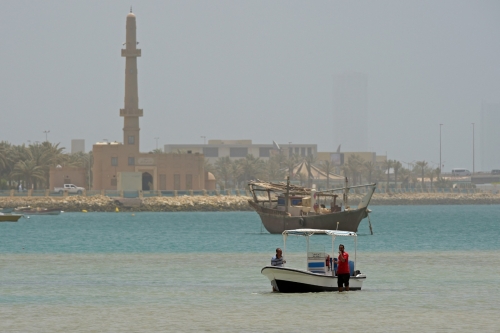The Silent Threat of Rising Sea Levels
By KOTA SRIRAJ
Amongst the myriad of environmental challenges, the most lethal and also the most silent threat happens to be the sea level rise. For an island nation like Bahrain, this natural threat assumes ever increasing proportions as land is already scarce and the prospect of the sea level rise usurping the coastal land seems daunting. Even a rise of 0.5 to 2 meters can submerge 5 to 18 percent of Bahrain’s total area. In fact, Bahrain has already recorded sea level rises between 1.6 mm to 3.4 mm C every year since 1976. But this problem may get more difficult in the future. According to the Intergovernmental Panel on Climate Change data, by year 2050 sea levels could rise by at least 0.5 meter which can not only threaten the coastal and low-lying areas but also pollute the quality of ground water.
The Kingdom is already battling with climate change and extreme heat. In this year alone temperatures in Bahrain have frequently breached the 44-degree Celsius mark sending the air-conditioners into overdrive. But Bahrain is bravely fighting the hostile climatic conditions and is taking effective measures to meet the challenges.
In order to minimise the damage due to rising sea levels, Bahrain is planning to shore up its coastal defences by widening the beaches and constructing taller sea walls and elevating land. The nation is also taking commendable steps by aiming at reducing emissions by 30 percent by 2035 and scale up renewable energy to meet 10 percent of its energy needs.
Bahrain is also looking to double the areas covered by greenery and quadruple the number of mangroves. As these areas then can absorb carbon dioxide from the atmosphere over the next 12 years.
But there is another reason why Bahrain must not only put the multiplying of mangroves on fastrack but should also add development and proliferation of salt marshes to the effort. Mangroves and salt marshes trap sediment and organic matter, allowing them to increase the land elevation.
That affords rising protection against sea water inundation. In fact, according to National Oceanic and Atmospheric Administration (NOAA), just 15 horizontal feet of marshy terrain can absorb 50 percent of incoming wave energy.
Similarly, Bahrain can also increase the focus on sea reefs as they grow faster and tend to outpace rising sea levels besides being good natural barriers.
The rising sea levels are a silent threat globally and Bahrain is valiantly fighting with the same with resolve and determination. Adding the above initiatives to the efforts can help get even better results faster.
(The views and opinions expressed in this article are those of the author and do not necessarily reflect the official policy or position of the Daily Tribune)
Related Posts


